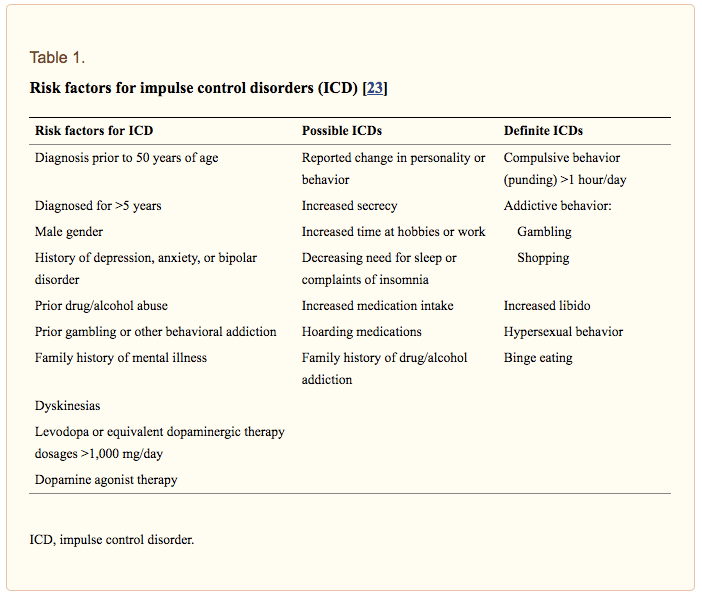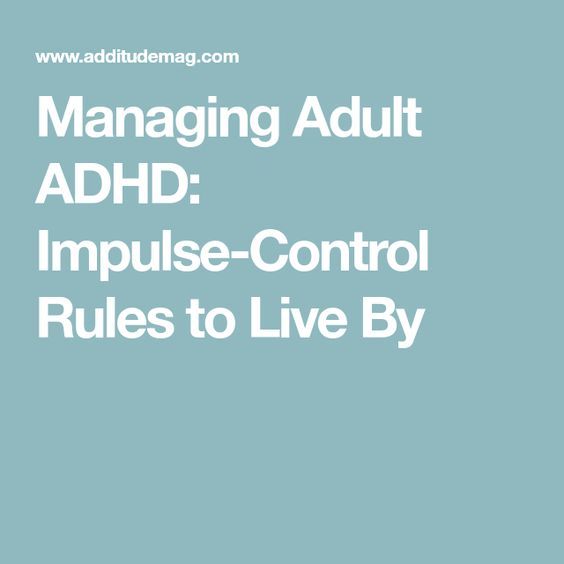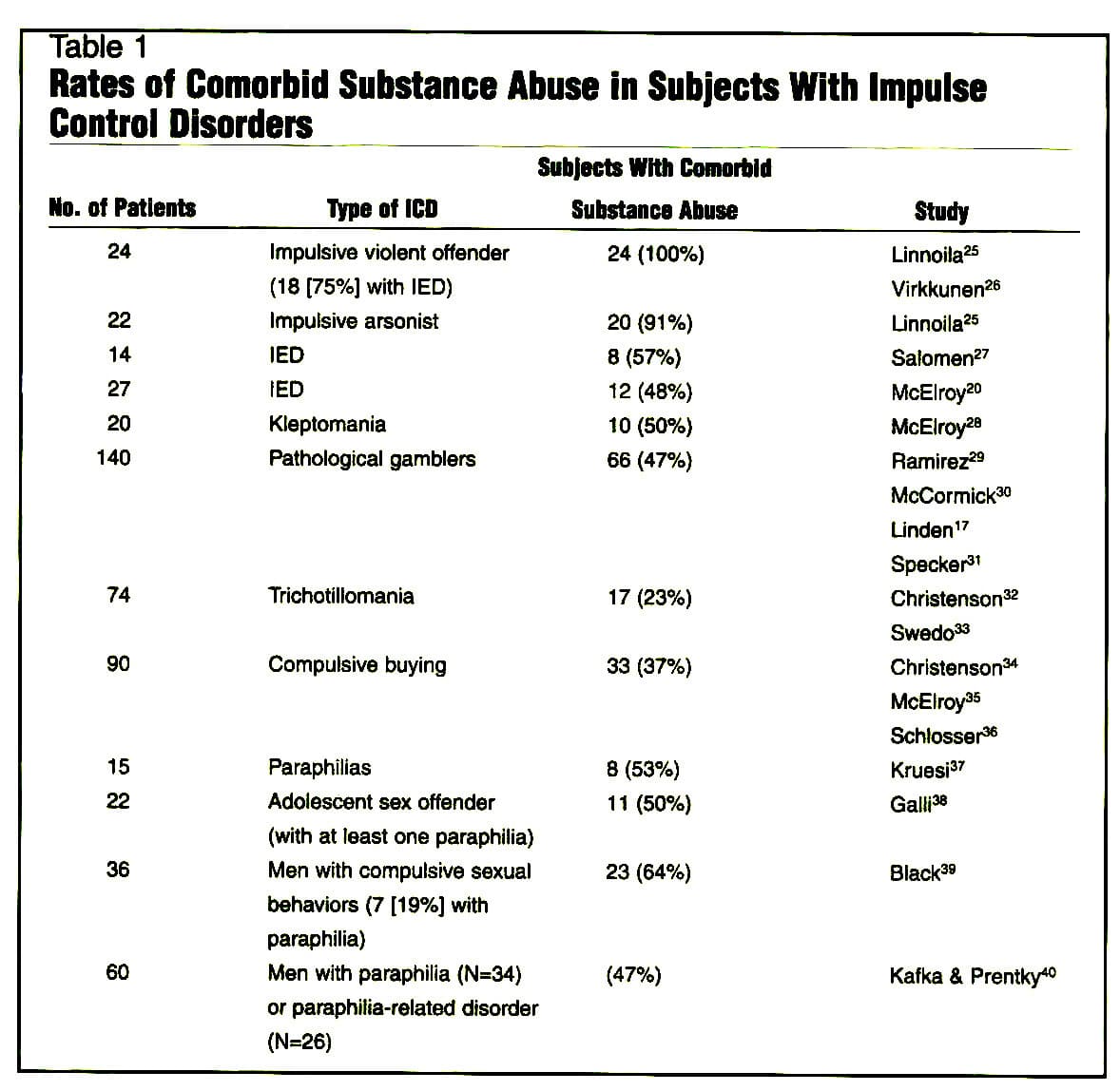Risk Factors For Those With Impulse Control Disorders
Chronic substance abuse is considered a risk factor for these disorders. But thats not the only suggested cause. More often, it can be traced back to childhood experiences and genetics.
Risk factors include:
- history of abuse, neglect, or trauma
- growing up in a violent household
- co-occurring mental illness
- genetic predisposition
Men are also more likely to be diagnosed with impulse control disorders, although the cause of that is not entirely clear.
Types Of Impulse Control Disorder
There are five different types of impulse control disorders that are considered formal conditions. In addition to these disorders, other mental health conditions may also have characteristics of an impulse control disorder. However, these five types are considered stand-alone conditions.
The five types of impulse control disorder include:
- Pyromania This condition characterizes the uncontrollable impulse to set fires. People with pyromania often feel an intense urge that is only relieved by starting a fire. They may also feel pleasure when setting fires.
- Kleptomania Kleptomania is when a person experiences the urge to steal and acts on it. People with kleptomania do not steal out of necessity. They steal because it feels good and they cannot resist the impulse.
- Intermittent Explosive Disorder This condition is when a person cannot control the urge to respond angrily to a seemingly minor trigger. Anger outbursts are often excessive compared to the triggering event.
- Trichotillomania Trichotillomania is when a person cannot resist the impulse to pull out his or her hair. This can be hair that is on the head or on the body. The impulse to act in this behavior outweighs any pain that may be experienced as a result.
- Pathological Gambling This condition, also referred to as compulsive gambling, is when a person cannot resist the urge to gamble.
Symptoms Of Impulse Control Disorder
Symptoms of an impulse control disorder will vary depending on the condition the person has. However, there are a few symptoms that are typically shared in most people with an impulse control disorder.
These symptoms may include:
- inability to resist the urge to act on an impulse
- tension and anxiety before acting on an impulse
- continued impulsive behavior despite negative consequences
People with impulse control disorder may also be socially withdrawn and isolated. They may feel constant guilt or regret as a result of their impulsive actions.
Also Check: How To Stop Masterburate Addiction
Addiction And Impulse Control
People often view those who engage in substance abuse as lacking willpower or self-control. On the surface, lacking impulse control would seem to fit in with this description. However, impulse control is a result of brain chemistry. People who have certain types of brain chemistry are more susceptible to abusing substances or using them in the first place. For example, experts have found that people with behavioral addictions like gambling or sex have abnormal chemistry in their brains reward processing center. This is why people with substance use disorders and people with process addictions often have genetic similarities. Does a lack of impulse control lead to addiction? The answer is more complex than it would seem.
How To Stall Distract And Resist Impulses

During addiction treatment, you might learn the stall, distract and resist method of controlling impulses. When you have an urge or craving, the first step is to stall yourself on acting on the urge. This gives the urge a chance to subside. However, as previously mentioned, people who lack self-control often become tense and stressed when they cant act on their impulses. The next step then is to distract yourself. This can take many forms. You can physically remove yourself from whatever is causing the craving, or you can move onto something else that requires your whole focus. For example, exercising or making a phone call.
Read Also: Substance Use Disorders And Addictions
What Qualifies Someone For A Diagnosis Of Intermittent Explosive Disorder
To qualify for an IED diagnosis, someone must demonstrate impulsive verbal or physical aggression approximately twice a week for at least 3 months. Someone who explodes less frequently can also qualify if their outbursts are particularly destructive three outbursts in a 12 month period that result in physical injury or property damage may also trigger an IED diagnosis.
Is Addiction An Impulse Control Disorder
Addiction is not classified as an impulse control disorder. But impulsiveness is a key risk factor for addiction, and often plays a strong role in someones early motivation to seek drugs. Whats more, impulse control disorders are risk factors for addiction. Thus, understanding the connection between impulse control challenges and substance use may help individuals better manage both conditions.
To learn more about overcoming addiction, see the Addiction Center.
Recommended Reading: How To Stop My Sugar Addiction
How Are They Different From Similar Disorders
While other disorders may involve difficulty controlling impulses, that is not their primary feature. For example, while people with attention-deficit/hyperactivity disorder or in a manic state of bipolar might have difficulty controlling their impulses, it is not their main problem.
Some health professionals consider impulse control disorders subgroups of other conditions, such as anxiety disorders or obsessive-compulsive disorders. Some medications for treating depression and anxiety also have been successful in treating impulse disorders, particularly antidepressants known as serotonin reuptake inhibitors. This suggests the neurotransmitter serotonin plays a role in these disorders.
Causes Of Impulse Control Disorders
The fact is, scientists dont know exactly what causes an individual to engage in destructive behavior impulsively. But there is a general consensus among researchers that many factors, interacting together, can cause these problems. These factors can be both environmental and physical, cultural and societal, or biological and emotional. Certain parts of the brain play a role. For example, the limbic system, which controls functions of memory and emotion, and the frontal lobe, which is associated with the process of planning and impulse control. If there is a chemical imbalance in these parts of the brain or physical damage, it can lead to impulsive behavior.
Also, professionals identified hormones as having a significant effect on certain behaviors. For instance, testosterone, more prevalent in men, has been cited as a cause of increased aggressiveness and violent tendencies. These hormones alter the way individuals experience their emotions and react in the world.
Recommended Reading: What Is Love Addiction Symptoms
How Do You Treat Impulse Control Disorders
Cognitive behavioral therapy, or CBT, has been found to be effective for many impulse control disorders. In addition, relaxation techniques and aversion therapy have both been found to be beneficial. In cases of interpersonal conflict resulting from impulsive behavior, family therapy or couples therapy may provide additional support. Because the disorders are often comorbid with other conditions that must be factored into treatment, such as substance abuse or depression, approaches vary. Effective treatment may draw on both psychopharmacological methods, such as antidepressants, and psychotherapy.
When Does An Impulsive Behavior Become A Disorder
Acting impulsively does not mean a person necessarily has a mental health disorder. An impulse control disorder is characterized by a pattern of behaviors that may feel uncontrollable.
People with an impulse control disorder may:
- repeatedly act in ways they know are illegal or harmful
- feel guilt or remorse about their behaviors
- have difficulty controlling their emotions or actions
- experience severe disruptions to their way of life due to their behavior
Having this type of disorder can affect a persons relationships, work, school, or ability to excel in various areas of their life as a result of their behaviors.
Find the right dual diagnosis treatment program today.
Don’t Miss: How To Stop Drug Addiction At Home
Impulse Control Disorder And Addiction
Home » Impulse Control Disorder and Addiction
Addiction, also referred to as substance use disorder, is listed in the Diagnostic and Statistical Manual of Mental Disorders, Fifth Edition , as a chronic brain disorder. It is characterized by compulsively engaging in rewarding stimuli without regard for consequence. An individual that struggles with addiction will prioritize satisfying his or her drug cravings above all else, which can affect all areas of his or her life. Obligations can fall by the wayside when an individual struggles with addiction, leading to relationship fractures, financial hardship, legal complications, and more. Addiction is a mental disorder and when active, essentially renders an individual unable to exert control over his or her substance-abusing compulsions.
Impulse Control And Addiction Disorders

People with an impulse control disorder cant resist the urge to do something harmful to themselves or others. Impulse control disorders include addictions to alcohol r drugs, eating disorders, compulsive gambling, paraphilias sexual fantasies and behaviors involving non-human objects, suffering, humiliation from childhood, compulsive hair pulling, stealing, fire setting, and intermittent explosive attacks of rage.
Some of these disorders, such as intermittent explosive disorder, kleptomania, pyromania, compulsive gambling, and trichotillomania, are similar in terms of when they begin and how they progress. Usually, a person feels increasing tension or arousal before committing the act that characterizes the disorder. During the act, the person probably will feel pleasure, gratification, or relief. Afterward, the person may blame himself or feel regret or guilt.
Don’t Miss: Can You Be Addicted To Food
Treatment For Impulse Control Disorders And Addiction
Overcoming substance addiction isnt easy, especially if you have a co-occurring disorder. For people who have co-occurring disorders, a specialty treatment program may be recommended.
Dual diagnosis programs, which integrate mental health and substance abuse treatment services, are considered the most effective type of treatment for people with co-occurring disorders.
Within a treatment program, impulse conduct disorders and addiction can be treated through individual and group therapy, behavioral therapy, and other behavioral interventions.
How To Build Better Self
Learning self-control is like learning a new skill. Like any new skill, you can develop it better by building a foundation of actions and practices to help you learn. Take a look at the following list for building self-control while recovering from addiction:
Keeping a positive attitude Setting definable and reachable goals Monitoring your progress towards these goals Visualizing the rewards of reaching your goals Avoiding triggers Practicing willpower Understanding that each milestone makes the next a bit easier
Another method for resisting triggers and impulses to develop better self-control is making if-then goals. For example, If I go to a party where theres drinking, then I will immediately turn around and leave. An if-then goal is where you give yourself a theoretical situation and then establish your response to it.
As you get further down the path of recovering from addiction, youll likely face the potential of relapse and be tasked with preparing yourself to encounter triggering situations. Learning ways to stall, distract and resist these triggers not only helps your path to sobriety but also your development of better self-control.
Learning self-control isnt the same thing as recovering from addiction, but it is an essential part of sustained recovery. Theres no single step or method to learning better self-control. Like any skill, its something that has to be continuously worked on and practiced until it becomes second nature.
Don’t Miss: What Is Addiction To Alcohol
Unspecified Impulse Control Disorder
If someone has impulses that don’t fit neatly into one of the other types, they may be diagnosed with unspecified impulse control disorder. Problematic internet use, for instance, may be classified as an unspecified impulse control disorder. Treatment varies based on the impulse symptoms and severity.
Addiction Recovery And Impulse Control
As uncontrollable impulses are strongly related to addictive behavior, its no surprise that focusing on self-control is a big part of recovering from addiction. You can think of dealing with urges and impulses like learning how to skate or play an instrument. You start as a beginner and work on behaving differently. You consistently practice ways to control your impulses as you go through recovery. It probably wont be comfortable at first, and youre likely to feel incompetent or not up to the task. However, its important to remember that self-control is a skill. Just like some people are naturally good at skating or playing instruments, some people are naturally good at controlling their impulses. But, that doesnt mean that people who arent naturally good at it cant learn.
Also Check: Counseling For Family Members Of Addicts
Learn About Impulse Control
When children and adolescents severely struggle to control their emotions and behaviors, they may potentially be suffering from an impulse control disorder. Impulse control disorders are characterized by chronic problems in which people lack the ability to maintain self-control which ultimately results in the onset of extreme disruptions and dysfunctions in personal, familial, social, and academic aspects of their lives. Children and adolescents with impulse control disorders frequently engage in repetitive, destructive behaviors despite the adverse consequences that arise from the participation in those behaviors. These individuals do not possess the necessary skills required to govern behaviors and emotional responses appropriately and treatment is necessary. Even in cases where individuals suffering from these conditions have a desire to gain control over their emotions and behaviors, they find it difficult, and almost impossible, to do so due to the fact that the urges to participate in the behaviors are undeniably overwhelming and all-consuming.
Some of the most common forms of impulse control disorders that present in children and adolescents are described in the following:
Causes and Risk Factors
What Causes Kleptomania
Similar to intermittent explosive disorder, kleptomania is thought to be caused, at least in part, by disruptions in neurotransmitter pathways that deal with serotonin and dopamine, which play a role in aggression and how the brain responds to reward. There may also be imbalances in the brains opioid system, which influences ones ability to resist urges.
Read Also: How To Convince An Addict They Need Help
When To Seek Help
According to survey results published by Harvard Health, less than 20% of individuals battling intermittent explosive disorder receive specific treatment for their rage episodes. However, its essential to seek medical attention when you suspect you or your loved one is displaying any signs of impulse control disorder.
A psychological evaluation can help identify any underlying mental health disorder and any substance use disorder contributing to the behavior. The same applies if you or your loved one starts experiencing negative consequences at work or school due to their behaviors.
The sooner you reach out for help, the better the outcome. Diagnosing ICDs can be difficult and may take time as therapists and doctors sort out other potential conditions. If you recognize any of the signs above, dont label them as mere personality issues, these outbursts could result from a much serious condition.
Impulse Control And Co

Although impulse control and alcohol abuse are separate disorders, they do share common features. They are called co-occurring disorders, or the presence of both an SUD and a mental health issue like ICD. Data supports that many people with an ICD also suffer from substance abuse with numbers as high as 50%.
As with other dual diagnoses, it is hard to pinpoint which disorder emerged first. Was it the SUD that led to the ICD or the other way around? Of course, not all who have an SUD have an ICD. Just as true is the fact that not all people with impulse control issues have an SUD.
Receive Guidance, Call Now
Don’t Miss: How To Stop Being Addicted To Masturbation
The Relationship Between Impulse Control And Addiction Disorders
Impulse control disorders , including pathological gambling, trichotillomania, kleptomania, and others, have been conceptualized to lie along an impulsive-compulsive spectrum. Recent data have suggested that these disorders may be considered addictions and may associate with drug or alcohol abuse.
Diagnostic criteria for ICDs like pathological gambling overlap with those for substance dependence, with specific criteria relating to tolerance, withdrawal, repeated unsuccessful attempts to cut back or quit, and interference in major areas of life functioning.
What Is Impulse Control
Impulse control is the ability to control a persons urges but those with impulse control disorders experience difficulty holding back from a feeling of tension that builds up prior to acting out on it. An impulse could be towards a number of things gambling, substance abuse, sexual gratification and much more in 2015, The Fix, a website that publishes information related to both addiction and recovery, explained that impulse control issues tend to go hand in hand with substance use disorders . They stated,
One has to fight the initial urge to drink and do drugs in the first place. Then once you get clean, the impulse to pick up again is going to come up, again and again.
Theres often the argument that those with addiction have a lack of willpower, and a lack of impulse control could seem, on the surface, just like this. Its important to note, however, that impulse control has much more to do with a persons brain chemistry and while a person is partly responsible for becoming involved with substance use in the first place, its their brain chemistry that make them incredibly more susceptible to abusing substances when they may otherwise have not done so.
Also Check: How To Stop Gaming Addiction
What Are The Core Characteristics Of Impulse Control Disorder
Core characteristics of impulse control disorder are impulsivity and compulsive behavior. The main features of impulse control disorder are listed below.
- Inability to resist the impulse, temptation, drive, or compulsive need to perform a specific act or behavior which is harmful to the person or others
- Increasing sense of arousal or tension prior to performing the act
- Experiencing a strong sense of pleasure, release, or gratification while performing the act
Every type of impulse control disorder has its specific traits. The types of impulse control disorders are listed below.
